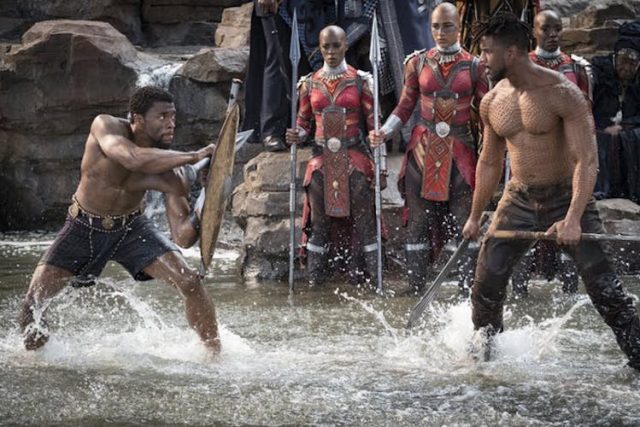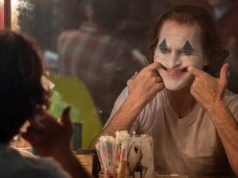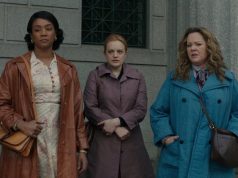
“Black Panther” is a bold entry in the Marvel Cinematic Universe, not (just) because there are hardly any white people in it but because there’s almost nothing connecting it to the other films. Apart from the obligatory Stan Lee cameo and references to the events of “Captain America: Civil War,” you’d hardly know this was a Marvel movie at all: no portals in the sky, no metropolises leveled, no mentions of Thanos or his stupid Infinity Stones. It’s the closest thing to a standalone entry we’ve had since this franchise started, which is refreshing by itself.
Even better? It’s pretty good, full of nobility and purpose without sacrificing fun and charm. Proudly directed by Ryan Coogler (“Fruitvale Station,” “Creed”) from a screenplay he wrote with Joe Robert Cole, “Black Panther” is more serious-minded than its glib predecessors, steeped in African lore and spectacle, with traditional costumes, dancing, and mysticism folded seamlessly into a story centered around the fictional nation of Wakanda. Like “Coco,” it stealthily introduces American audiences to foreign cultures while delivering new heroes who cross national and ethnic boundaries — a painless expansion of our horizons that also happens to kick butt.
Wakanda’s new king is T’Challa (Chadwick Boseman), who by virtue of his office is also the Black Panther, a mighty figure with superhuman strength and agility courtesy of a sacred herb, and a high-tech suit courtesy of his delightfully insubordinate genius sister, Shuri (Letitia Wright), whose inevitable meeting with Tony Stark we cannot wait to see. Wakanda presents a facade of a simple third-world nation, but it’s actually a technologically advanced society powered by vibranium, the strongest substance in the Marvel Cinematic Universe, a mountain of which sits in the heart of Wakanda. T’Challa intends to continue his country’s tradition of isolationism, protecting itself by keeping others out and by not revealing its power to the world.
“Iron Man” (2008) B
“The Incredible Hulk” (2008) B
“Iron Man 2” (2010) B-
“Thor” (2011) B
“Captain America: The First Avenger” (2011) B
“The Avengers” (2012) B+
“Iron Man 3” (2013) B+
“Thor: The Dark World” (2013) C-
“Captain America: The Winter Soldier” (2014) B
“Guardians of the Galaxy” (2014) B
“Avengers: Age of Ultron” (2015) B-
“Ant-Man” (2015) B
“Captain America: Civil War” (2016) B
“Doctor Strange” (2016) B+
“Guardians of the Galaxy Vol. 2” (2017) B-
“Spider-Man: Homecoming” (2017) B+
“Thor: Ragnarok” (2017) B
“Black Panther” (2018) B
“Avengers: Infinity War” (2018) B-
“Ant-Man and the Wasp” (2018) B
“Captain Marvel” (2019) B-
But there are Wakandans who disagree with this tactic. Chief among them is Erik, nicknamed Killmonger (Michael B. Jordan), who grew up in the United States and has seen firsthand how “people who look like us” are oppressed, their communities ruined by drugs, their men disproportionately incarcerated. Wakanda has the weapons technology to support a worldwide uprising of black people, but T’Challa insists that the Wakandan way is never to fight unless absolutely necessary. It’s the old Professor X/Magneto debate, repurposed for something with weightier, more fraught implications than the treatment of mutants.
As you can see, we don’t need the Avengers here; this is a local dispute to be handled internally. Coogler populates Wakanda with fierce, colorful characters who help us understand the details of this new society we’ve been dropped into without resorting to boring exposition. T’Challa’s ex-girlfriend, Nakia (Lupita Nyong’o), is a trusted adviser. The fearsome General Okoye (Danai Gurira) leads an army of bald female soldiers and is, by herself, utterly terrifying, capable of destroying an enemy (at least emotionally) with a glance. The regal queen mother (Angela Bassett), a passionate elder statesman (Forest Whitaker), an old friend (Daniel Kaluuya), and a rival tribal leader (Winston Duke) all figure prominently, as do a CIA agent (Martin Freeman in a bad American accent) and an insane one-armed arms dealer (Andy Serkis). Also, there are war rhinos. War rhinos!
Structurally, there’s nothing about the film that’s unusual, except within the comic book genre. It isn’t an origin story explaining how Black Panther got his powers (or even what his powers are, really). It doesn’t seem to be setting up plot threads for sequels (until the post-credits scene, which doesn’t count because the movie’s OVER by then, man). It’s so far removed from the usual superhero tropes — thwarted bank robberies, media fame, secret identities, etc. — that viewers who had their hearts set on the regular formula will be disappointed if they don’t recalibrate to Coogler’s rhythm. Our hero’s powers are inseparably connected to his nation’s history and customs in a way that no other superhero can claim — not even Captain America, who was made in a lab as a propaganda tool and, despite his name, isn’t inherently American, not in the way T’Challa is inherently Wakandan.
All of that makes “Black Panther” different. What makes it good is the collaborative sincerity, the sense that the large cast of black actors has worked in solidarity to produce something inspiring for their community while having a blast playing within the boundaries of the Marvel world, creating characters with the potential to interact in interesting ways with the ones we already know. It’s not just that there’s finally a superhero with African roots. It’s that the whole thing is done with dignity, un-patronizingly, a slam-bang action adventure that also fills a need.
B (2 hrs., 14 min.; )





